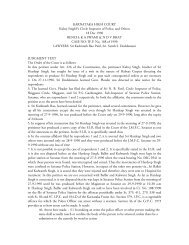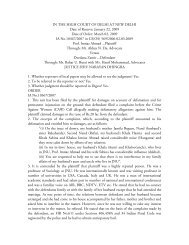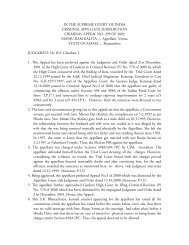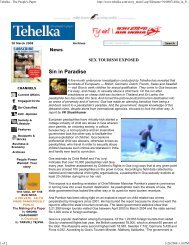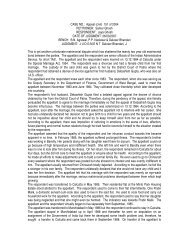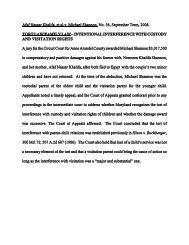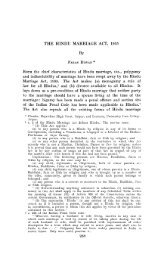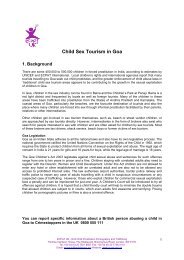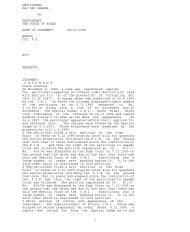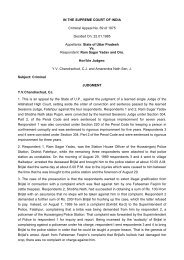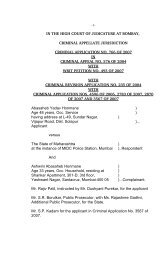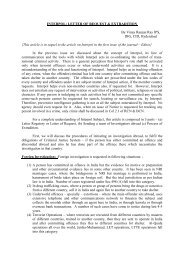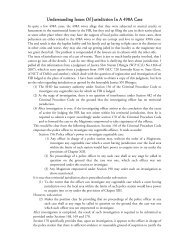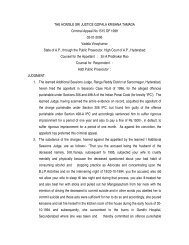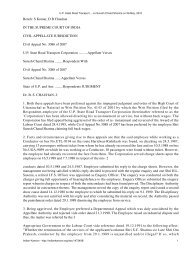AP HC Quotes Dowry Prohibition Act In Judgment: 2005 - IPC 498A
AP HC Quotes Dowry Prohibition Act In Judgment: 2005 - IPC 498A
AP HC Quotes Dowry Prohibition Act In Judgment: 2005 - IPC 498A
You also want an ePaper? Increase the reach of your titles
YUMPU automatically turns print PDFs into web optimized ePapers that Google loves.
that the High Court should not readily exercise its power under Article 226 of<br />
the Constitution of <strong>In</strong>dia or Section 482 of the Code of Criminal Procedure, 1973<br />
for quashing the proceedings emanating from a First <strong>In</strong>formation Report or<br />
complaint and that such power should be exercised sparingly and with great care<br />
and circumpspection. <strong>In</strong> Bhajan Lal's case (supra), the Supreme Court considered<br />
the ambit and scope of the power vested in the High Court under Article 226 of<br />
the Constitution and Section 482 Cr.P.C. and ruled that the High Court should<br />
not embark upon an enquiry into the merits and demerits of the allegations and<br />
quash the proceedings without allowing the investigating agency to complete its<br />
task......" (emphasis supplied)<br />
The primary question, which arises for consideration in proceedings under<br />
Section 482 Cr.P.C, is whether the allegations in the first information report<br />
or the complaint, even if they are taken at their face value and accepted in its<br />
entirety, do not make out a case against the accused For determination of this<br />
question it becomes relevant to note the nature of the offences alleged, its<br />
ingredients and the averments made in the complaint. (Hridaya Ranjan Prasad<br />
Verma v. State of Bihar16).<br />
<strong>In</strong> Anil Mahajan v. Bhor <strong>In</strong>dustries Ltd.,17 the Supreme Court observed:-<br />
"...... The substance of the complaint is to be taken. Mere use of the<br />
expression "cheating" in the complaint is of no consequence. Except mention of<br />
the words "deceive" and "cheat" in the complaint filed before the Magistrate and<br />
"cheating" in the complaint filed before the police, there is no averment about<br />
the deceit, cheating or fraudulent intention of the accused at the time of<br />
entering into MOU wherefrom it can be inferred that the accused had the<br />
intention to deceive the complainant to pay..........." (emphasis supplied)<br />
No doubt, exercise of the powers, under Section 482 CrPC, by the High Court<br />
should be limited to very extreme exceptions but in a case where the ingredients<br />
of the alleged offences are not satisfied, even prima facie, it cannot be said<br />
that power under Section 482 CrPC should not be exercised. If no offence is made<br />
out, from the allegations in the complaint, there should be no hesitation in<br />
exercising the power under Section 482 CrPC to pass appropriate orders. (S.W.<br />
Palanitkar v. State of Bihar18).<br />
While it is true that a complaint need not verbatim reproduce in the body<br />
of the complaint all the ingredients of the offences alleged nor is it for this<br />
Court to split up the definition into different components of the offence to<br />
make a meticulous scrutiny whether all the ingredients have been precisely spelt<br />
out in the complaint, in cases where the information in the complaint is so<br />
bereft of even the basic facts which are essential for making out the offence,<br />
the complaint is liable to be quashed. (Rajesh Bajaj Vs. State NCT of Delhi19).<br />
The allegations in the complaint must be read as a whole and in its entirety,<br />
(R.P. Kapoor Vs. State of Punjab20, Anil Mahajan17, Hridaya Rajnan Prasad<br />
Verma16, Zandu Pharmaceuticals Works Ltd15) and a prima facie case of the



